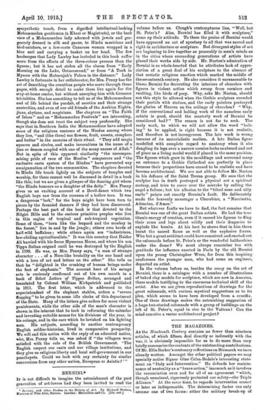SOUTHERN INDIA.*
• ninepin of Edanstioa. By E. IL. Sewell. London: Longman: and Co. • &Whirrs. /ndia. Painted by Lady Lawley. Described by P. E. Penny.
WE have here a pleasant, readable book, in which the painter and the writer put before us many picturesque and interesting phases of native life in Southern India Lady Lawley's water- colour sketches, which are reproduced in colour, use exceedingly attractive. They are chiefly of single figures, standing out clearly againat a plain background. Sometimes a beautiful piece of Oriental furniture, or the stock-in-trade of the model. forms part of the picture, but as a rule Lady Lawley depends upon lively and clever characterization for the interest of her pictures. She depicts many aides of Oriental life with a sympathetic touch, from a dignified intellectual-looking Mohammedan gentleman (a Khazi or Magistrate), or the back view of a Mohammedan lady adorned with jewels and gor- geously dressed in silk and gauze, to Hindu musicians and bird-catchers, or a low-caste Canareee woman wrapped in a blue sari and carrying a basket on her head. The few landscapes that Lady Lawley has included in this book suffer more from the effects of the three-colour process than the figures; but it has not stolen all the charm from "Early Morning on the Lake, Ootacamund," or from "A Tank in Mysore with the Maharajah's Palace in the distance." Lady Lawley is fortunate in her collaborator, for Mrs. Penny has the art of describing the countless people who move through these pages, with enough detail to make them live again for the stay-at-home reader, but without annoying him with tiresome trivialities. She has something to tell us of the Mohammedans and of life behind the purdah, of ascetics and their strange austerities, and even of our old friends of the Arabian Nights, gnus, shytans, and magicians. Her chapters on "The Faith of Islam" and on "Mohammedan Festivals" are interesting, though she does not treat the subject very profoundly. She says that in Southern India the Mohammedans have adopted some of the religious customs of the Hindus among whom they live, "and (like them) use flowers, fruit, sweets, camphor, and butter" in the exercise of their ritual. "They add magic squares and circles, and make invocations in the name of a jinn or demon coupled with one of the many names of Allah." But in spite of this apparent similarity 'the uncompro- mising pride of race of the Muslim' conquerors and "the exclusive caste system of the Hindus" have prevented any amalgamation of the two communities. The chapters devoted to Hindu life touch lightly on the subjects of temples and worship, for these cannot well be discussed in detail in a book like this; but we are given a glimpse of the dancing girl whom 'the Hindu honours as a daughter of the deity." Mrs. Penny gives us an exciting account of a Devil-dance which two English boys saw from the recesses of a hollow tree. It was a dangerous "lark," for the boys might have been torn to pieces by the frenzied dancers if they bad been discovered. Perhaps the best part of the book is that devoted to the Nilgiri Hills and to the curious primitive peoples who live in this region of tropical and sub-tropical vegetation. Some of them, "born like the leopard and the monkey in the forest," live in and by the jungle ; others own herds of half-wild buffaloes ; while others again are "industrious, law-abiding agriculturalists." It was this country that Haider Ali harried with his fierce Mysorean Horse, and where his son Tippn Sultan reigned until he was destroyed by the English in 1799. He was, as Mrs. Penny says, "a man of strange character . . . of a Nero-like brutality on the one hand and with a love of art and letters on the other." She tells us that he "delighted in the crushing of human beings under the feet of elephants." The account here of his savage acts is curiously confirmed out of his own mouth in a book of Select Letters of Tippoo Sultan, arranged and translated by Colonel William Kirkpatrick and published in 1811. The first letter, which is addressed to the superintendent of the elephant stables, orders a "severe fogging" to be given to some idle clerks of this department of the State. Many of the letters give orders for more violent punishments, while the other side of the man's character is shown in the interest that he took in reforming the calendar and inventing suitable names for his divisions of the year, in his coinage, and in the care which he lavished on his fighting men. His subjects, according to another contemporary English soldier-historian, lived in comparative prosperity. We will end this notice with the reply of an educated native, who, Mrs. Penny tells us, was asked if" the villagers were satisfied with the rule of the British Government. 'The English respect our caste and our village institutions, and they give us religious liberty and local self-government in our punchayets. Could we look with any certainty for similar concessions from any other nation, European or Asiatic 9'"







































 Previous page
Previous page